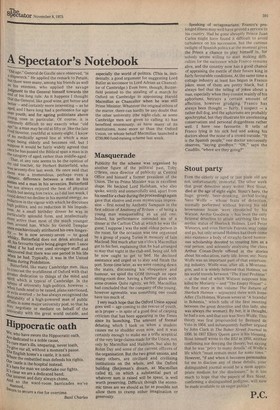Masquerade
Publicity for the scheme was organised by another figure of the political past, Toby O'Brien, once director of publicity at Central Office and himself a former president of the Union. The ex-Prime Minister was in excellent shape. He heckled Lord Hailsham, who also spoke, wittily and unmercifully and, apart from his need for a chair during the proceedings again gave that elusive and even mysterious impression — first noted by Anthony Sampson in the first edition of Anatomy of Britain — of being a young man masquerading as an old one. Indeed, his performance reminded me of a dinner at the Carlton Club at which he was the guest. I suppose I was the next oldest person in the room, for the occasion was one organised by a group of young Tories in memory of lain Macleod. Not much after ten o'clock Macmillan got to his feet, explaining that he had arranged to stay that night in the club and, being old, felt he now ought to get to bed. He declined assistance and urged us to stay and finish the port. Some time later, as we were coming down the stairs, discussing his eloquence and humour, we spied the GOM through an open sitting-room door, having a further glass with some cronies. Quite rightly, we felt, Macmillan had concluded that the company of the young, however agreeable, was something one could have too much of.
I very much hope that the Oxford Union appeal goes well — age coming to the rescue of youth, as is proper — in spite of a good deal of carping criticism that has been appearing in the Times since its launching. The amount of formal debating which I took on When a student causes me to shudder even now, and it was certainly enough to make me a trifle sceptical of the very large claims made for the Union, not only by Macmillan and Hailsham, but also by Robin Day and some of the current officers of the organisation. But the two great unions, and many others, are civilised and civilising institutions on the whole, and the Oxford building (Betjeman's dream, as Macmillan
called it), on which a substantial part of whatever sum is raised will be spent, is well worth preserving. Difficult though the economic times are we should as far as possible not allow them to cramp either imagination or generosity.
Speaking of octagenarians, Franco's prolonged illness may well have proved a service to his country. Had he gone abruptly Prince Juan Carlos might have found it difficult to avoid turbulence on his succession, but the curious twilight of Spanish politics at the moment gives the Prince a chance to play himself in, for nobody seems willing to start making difficulties for the successor while Franco remains alive, and the country now has a good chance' of appraising the mettle of their future king in fairly favourable conditions. At the same time a cottage industry at least has begun in Franco jokes: most of them are pretty black, but I always feel that the telling of jokes about a man, especially when they consist mainly of his aphorisms, betrays a certain amount of affection, however grudging. Franco has always been thought — fairly, I suspect — a rather dull dog, and the aphorisms are probably apochryphal, but they illustrate his unrelenting conservatism and personal doggedness rather well. I have one favourite. It tells of Franco lying in his sick bed and asking his doctors about the noise of a crowd outside. "It is the Spanish people," one doctor unctuously observes, "saying goodbye." "Oh," says the Caudillo, "where are they going?"
































 Previous page
Previous page